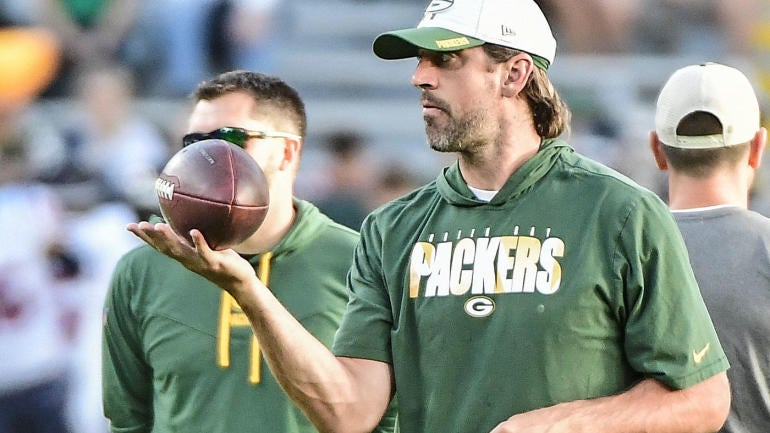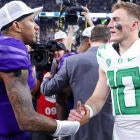
It's been nearly two weeks since Aaron Rodgers made it clear that he intends to play in New York this season, but despite that declaration, a trade still hasn't happened between the Packers and the Jets.
The two sides have had plenty of time to negotiate, but they just haven't been able to hammer out a deal that would make both teams happy. The Packers and Jets have apparently come close to agreeing on what the compensation would look like, but the main sticking point right now seems to be that the Jets want some protection in case Rodgers doesn't play in 2024, according to Yahoo Sports.
According to Yahoo, the framework of the deal currently looks like this:
- Jets get: Aaron Rodgers
- Packers get: 2023 second-round pick, conditional 2024 second-round pick -- the 2024 pick could become a first-rounder if the Jets hit "achievable team-performance escalators" during the 2023 season
The sticking point right now is that the Jets want a safety valve added to the trade that would protect them if Rodgers only plays one season in New York. According to Yahoo, the Jets want the Packers to send them a 2025 draft pick in case Rodgers decides to retire after the 2023 season -- the Jets don't want to give up two picks for one season of Rodgers.
The reason the Jets are concerned about Rodgers potentially retiring is because he said on March 15 that he had been leaning toward retirement before going on his darkness retreat.
"I've got to admit, I went into the darkness 90 percent retired [and] 10 percent playing," Rodgers said.
Not only are the Jets pushing for protection with a 2025 pick, but it was apparently their idea to put a conditional pick in the trade. On the other hand, the Packers are pushing to make this a normal trade that doesn't involve protections or conditions. If the two sides can get past these sticking points, that will open the path for a deal to get done.
The fact that Green Bay is willing to do a deal that doesn't necessarily involve a first-round pick might be a surprise to some, but Packers general manager Brian Gutekunst essentially confirmed that on Monday. He noted that under certain circumstances his team would be open to a trade that doesn't involve the Packers getting a first-round pick in return for Rodgers.
"That's not a necessity," Gutekunst said, via Yahoo. "But at the same time, the value of the player, he's a premier player. So, I think getting premier picks back for that or players is important."
According to multiple reports, the Packers were looking to get a first-round pick in the deal, but apparently, they've come off that price.
Although the two sides seem to be inching closer to getting a deal done, there's still no guarantee that it's going to happen anytime soon.
Jets coach Robert Saleh said on Monday that his team is in "no hurry" to get a deal done. Jets general manager Joe Douglas echoed that sentiment later in the day.
"There's not a ton of urgency from our standpoint right now. But still very optimistic," Douglas told reporters at the NFL's annual league meeting in Arizona.
The Packers likely don't mind waiting to make a trade because that could potentially help them. From a salary cap standpoint, it would actually be beneficial to Green Bay to trade Rodgers AFTER June 1. When the Packers trade Rodgers, they're going to take a $40.3 million dead cap hit, but if the trade comes after June 1, then that hit will be split over two seasons with $15.8 million coming in 2023 and $24.5 million in 2024, according to OvertheCap.
The downside of a post-June 1 trade for the Packers is that they wouldn't get a 2023 draft pick in the deal. If the Packers want a 2023 draft pick, they'll make sure to get the deal done before the start of the NFL Draft on April 27. If they want to free up some salary cap space, then they'll wait until after June 1 to make the deal.






















